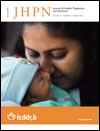Clean Home-delivery in Rural Southern Tanzania: Barriers, Influencers, and Facilitators
DOI:
https://doi.org/10.3329/jhpn.v31i1.14755Keywords:
Clean delivery, Handwashing, Formative research, Newborn, TanzaniaAbstract
The study explored the childbirth-related hygiene and newborn care practices in home-deliveries in Southern Tanzania and barriers to and facilitators of behaviour change. Eleven home-birth narratives and six focus group discussions were conducted with recently-delivering women; two focus group discussions were conducted with birth attendants. The use of clean cloth for delivery was reported as common in the birth narratives; however, respondents did not link its use to newborns health. Handwashing and wearing of gloves by birth attendants varied and were not discussed in terms of being important for newborns health, with few women giving reasons for this behaviour. The lack of handwashing and wearing of gloves was most commonly linked to the lack of water, gloves, and awareness. A common practice was the insertion of any family members hands into the vagina of delivering woman to check labour progress before calling the birth attendant. The use of a new razor blade to cut the cord was near-universal; however, the cord was usually tied with a used thread due to the lack of knowledge and the low availability of clean thread. Applying something to the cord was near-universal and was considered essential for newborns health. Three hygiene practices were identified as needing improvement: family members inserting a hand into the vagina of delivering woman before calling the birth attendant, the use of unclean thread, and putting substances on the cord. Little is known about families conducting internal checks of women in labour, and more research is needed before this behaviour is targeted in interventions. The use of clean thread as cord-tie appears acceptable and can be addressed, using the same channels and methods that were used for successfully encouraging the use of new razor blade.
J HEALTH POPUL NUTR 2013 Mar;31(1):110-117
Downloads
282
239

